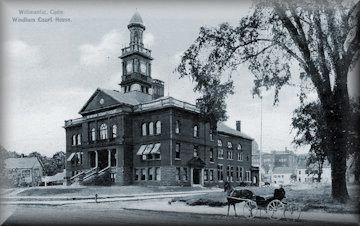

 |
 |
|
Windham County Connecticut Genealogy
 Windham County - Brief History In the early commerce between the colonies of Massachusetts
and Connecticut a popular route over the land was through the region
now covered by Windham county. Remote from the sea shore, and possessing
no navigable lakes or rivers, it was perfectly reasonable that this
territory should be for a time overlooked, or rather that it should
be passed by as a goodly land for the home-seekers in a new world to
locate upon. Accessibility by water was to the first settlers an almost
absolutely essential feature in any site chosen by them for the planting
of a little colony. But we may well imagine that the fertile valleys
and hills of this beautiful region, and the picturesque attractions
of the future Windham did not long remain unnoticed. The land became
known to the English about the year 1635. When, about that time, the
early colonists began to traverse the hideous and trackless wilderness,
on the way from Massachusetts to the Connecticut river, tradition tells
us their encampment for the night was on Pine hill in Ashford. A rude
track, called the Connecticut Path, obliquely crossing the Wabbaquasset
country, became the main thoroughfare of travel between the two colonies.
Hundreds of families toiled over it to new homes in the wilderness.
The fathers of Hartford and New Haven, ministers and governors, captains
and commissioners, government officials and land speculators, crossed
and recrossed over it. Civilization passed to regions beyond but made
no abiding place here for more than half a century.
|